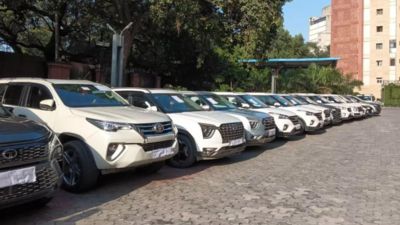NEW DELHI: After the blockbuster years post Covid priod, the
car industry
now stares at a squeeze with companies slashing
wholesales
to dealerships as buyers have become cautious and are not willing to spend freely, despite steep discounts.
The car industry, which had enjoyed a housefull at dealerships since the economy started to open up around 2021 and demand for personal mobility skyrocketed, finds itself in a tight spot after a long time as a
slowdown
has meant that discounts have come back with a vengeance and even the festive period – generally “where everything sells” – has also failed to bring in large volumes.
Wholesale figures released by industry body
Siam
shows that
passenger vehicles
dispatches went down 2% for the second quarter of this fiscal, which is surprising as companies start building up pre-festive inventory during this period. Against 10.7 lakh units sold to dealerships in second quarter of FY24, the numbers this time stand at 10.5 lakh units.
The situation is equally worrisome for the first half (Apr-Sep’24-25) where dispatches are up a marginal 0.5% at 20.8 lakh units against 20.7 lakh units in the same period of the previous fiscal.
Shailesh Chandra, president of Siam and MD for Passenger Vehicles and Electric Mobility at Tata Motors, said that the industry may grow by low single digits this year. “The first half for the passenger vehicles industry been flat, and even if we grow by over 5% in the second, we will end up at sub-5% for the full year,” Chandra said.
Siam had given a growth forecast between 5% and 8% for the passenger vehicles industry at the beginning of this fiscal.
The past few months have seen top auto makers such as Maruti Suzuki, Hyundai, and Tata Motors cut down dealer dispatches as they try and balance inventory levels to the market’s new reality.
Maruti, for which it is almost unusual to cut down wholesales just before the beginning of the festive Navratri, Diwali and Dussehra periods (seen as a generally bumper timeline), has been calling the wholesale reduction as “recalibration of its inventory” as the company claims to put focus on retail sales and registrations, senior executive officer (sales and marketing) Partho Banerjee said.
The industry says that a higher base, which was fueled by pent-up demand last year, has been diluting growth percentages for the industry this year.
Chandra said that the decline during the second quarter was driven by slow consumer demand and seasonal factors. “In contrast, industry offtake was significantly higher than registrations in anticipation of a strong start to the festive season, resulting in a continued buildup of channel stock.”


